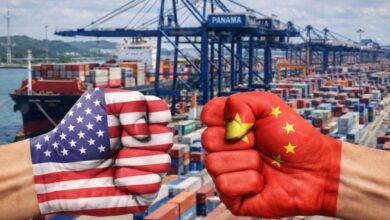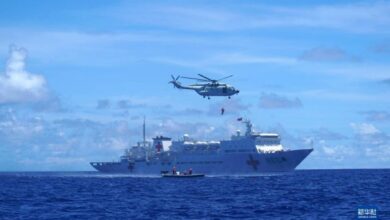Uruguay and China Strengthen Economic Ties for Trade Opportunities
Uruguay and China have embarked on a transformative journey of economic cooperation, signaling a significant shift in the South American nation's approach to global trade.

11/22/2023.- Chinese President Xi Jinping (R) and Uruguay’s President Luis Alberto Lacalle Pou shake hands during a welcome ceremony in the Northern Hall of the Great Hall of the People in Beijing, China. EFE/EPA/XINHUA / Liu Bin
Latin American Post Staff
Escucha este artículo
Leer en español: Uruguay y China fortalecen lazos económicos en busca de oportunidades comerciales
Uruguay and China Forge Strategic Partnership for Economic Collaboration
In a momentous development, Uruguay and China have taken decisive steps to elevate their bilateral ties, opening up a promising avenue for enhanced trade and investment opportunities. This strategic move positions Uruguay alongside fellow Mercosur members Brazil and Argentina, catapulting the country into a new realm of economic collaboration with the world's second-largest economy.
Uruguay's aspirations for expanded global trade have driven its pursuit of trade agreements beyond its local trade bloc. At the same time, China has been actively seeking closer ties with South American nations, primarily to secure access to essential raw materials, including grains and oils. These shared objectives have laid the groundwork for a comprehensive strategic partnership between the two nations.
Chinese President Xi Jinping expressed China's readiness to work closely with Uruguay, emphasizing establishing a comprehensive strategic partnership as a new starting point for their collaboration. President Xi outlined a vision to enrich cooperation, underscoring the importance of this momentous partnership.
Uruguay's Pursuit of Free Trade Agreement with China
For Uruguay, this collaboration holds immense potential. President Luis Lacalle Pou has been a vocal advocate for a free trade agreement (FTA) with China since 2021. The goal is to secure favorable trade opportunities for Uruguayan exporters, mirroring the benefits enjoyed by countries like Chile, Costa Rica, Ecuador, and Peru while boosting exports of raw materials, industrial goods, and technology.
However, the path to an FTA with China has been challenging. Uruguay's pursuit of such an agreement faces opposition from other Mercosur bloc members who prioritize an FTA with Europe. This divergence in objectives within Mercosur adds complexity to Uruguay's trade ambitions.
Notably, China currently imposes tariffs on Uruguayan beef, a critical export for the South American nation, constituting 67% of its exports to China in 2022. This market faces a substantial 12% tariff on the meat. In stark contrast, major beef-exporting countries like Australia and New Zealand, which have FTAs with China, benefit from significantly lower taxes at 3.3% and 0%, respectively.
During their meeting, President Lacalle Pou emphasized China's status as Uruguay's primary trading partner and discussed the nation's plans to join the New Development Bank, headquartered in Shanghai. This reflects Uruguay's determination to deepen its economic ties with China, capitalizing on the opportunities presented by this burgeoning partnership.
China's Growing Significance as a Trade Partner
China already plays a substantial role in Uruguay's trade landscape, receiving 27% of its exports in 2022. Brazil accounted for 17% of Uruguay's outbound shipments, while Argentina and the United States each purchased 6%. These figures underscore the growing significance of China as a pivotal trade partner for Uruguay.
Uruguay's ability to sign a unilateral FTA with China is constrained by its commitment to the 'Common External Tariff' agreed upon with Mercosur members. This commitment was solidified, in part, due to Mercosur's agreement in principle on an FTA with Europe in 2019. Thus, Uruguay needs to improve its ability to negotiate trade agreements independently.
Nevertheless, Uruguay has applied to join a significant trans-Pacific free trade pact, aligning with China's aspirations. However, both countries must navigate significant political hurdles before gaining access to this agreement, with Uruguay facing challenges similar to those imposed by its Mercosur membership.
Uruguay has previously come close to signing an FTA with the United States, an endeavor that was ultimately rejected over fears of expulsion from Mercosur. These historical experiences have left an indelible mark on Uruguay's approach to international trade agreements.
Potential Benefits of FTA with China
Under the Mercosur Common External Tariff, Chinese exporters are subject to a 9% tariff when exporting to Uruguay, a more favorable position than the 12% tariff imposed on Uruguayan beef bound for China. The potential benefits of an FTA with China, particularly for the meat industry, are substantial. A preferential rate of 0% could significantly reduce tariffs, potentially saving the industry $150 million.
President Xi and President Lacalle Pou presided over the signing of cooperation agreements spanning various sectors, including agriculture, education, science and technology, and customs inspections. These agreements promise to bolster Uruguay's meat exports and enhance its economic collaboration with China.
Remarkably, Uruguay is one of the few nations that maintain a trade surplus with China. In 2022, this surplus doubled to $1.5 billion, a remarkable increase from $766 million in 2021, as China's National Bureau of Statistics reported. This demonstrates the economic potential of Uruguay's strengthened ties with China.
Implications for Mercosur and Global Relations
The elevation of Uruguay's relations with China to the level of Brazil and Argentina carries broader implications. It pushes Paraguay, the remaining Mercosur member, further away from China's global trade and investment network. Paraguay, primarily reliant on agriculture, including beef and soybean exports, maintains ties with Taiwan, a stance that conflicts with China's territorial claims.
Also read: The IMF Renews a Credit Line of 35 Billion Dollars for Mexico for Two Years
President Xi aspires to build "a model of solidarity and cooperation between countries of different sizes, systems, and cultures" with Uruguay. President Lacalle Pou's response invited President Xi to visit Uruguay in the coming year. This exchange underscores the commitment of both nations to forge a meaningful partnership that spans economic, cultural, and diplomatic spheres.
As Uruguay and China embark on this transformative journey of economic cooperation, they set a compelling example of how nations of varying sizes and systems can collaborate to achieve shared goals, offering a potential blueprint for the future of international relations.




